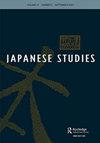Context-Dependent Script Choice in Emails: The Case of Sumimasen
IF 0.4
Q3 AREA STUDIES
引用次数: 0
Abstract
ABSTRACT This study examines how pragmatic factors influence Japanese script choice by focusing on the representation of ‘sumimasen’ – a phrase used to express apology and gratitude. In standard Japanese, this term is written in hiragana, but use of katakana for the term has been observed. Through a quantitative survey targeting 200 undergraduate Japanese-L1 students and investigating their impressions of different representations of sumimasen in Japanese emails, this study examines how context influences reader impressions of sumimasen representations. Here, ‘context’ specifically refers to three pragmatic factors of communication: situation, writer-reader relationship, and purpose. Through examining how alterations to the situation and relationship factors influence survey responses, the study reveals that reader impressions of katakana sumimasen differ depending on the respondent’s preferred politeness strategy. In focusing on this understudied question of how L1 readers respond to orthographic variation in context, the study expands on existing accounts of how katakana creates meaning by recognizing that interpersonal factors can influence the intent and reception of script variation. Additionally, the study finds that the social meaning of a given script variant can be dependent on the word it represents, with terms like sumimasen becoming active and accepted vehicles for meaning negotiation.电子邮件中上下文相关的脚本选择:Sumimasen的案例
摘要本研究通过关注“sumimasen”(一个用来表达道歉和感激的短语)的表达,探讨了语用因素是如何影响日语剧本选择的。在标准日语中,这个词是用平假名写的,但也有人使用片假名。通过一项针对200名日语- l1本科生的定量调查,调查了他们对日语电子邮件中不同的sumasen表征的印象,本研究探讨了语境如何影响读者对sumasen表征的印象。这里,“语境”特指交际中的三个语用因素:情境、作者与读者的关系和目的。通过考察情境和关系因素的变化如何影响调查结果,研究表明,读者对片假名的印象因受访者的首选礼貌策略而异。在关注L1读者如何在语境中对正字法变化作出反应这一未被充分研究的问题时,本研究通过认识到人际因素会影响文字变化的意图和接受程度,扩展了关于片假名如何创造意义的现有描述。此外,研究发现,一个给定的脚本变体的社会意义可能取决于它所代表的单词,像sumimasen这样的术语成为了活跃的、被接受的意义协商工具。
本文章由计算机程序翻译,如有差异,请以英文原文为准。
求助全文
约1分钟内获得全文
求助全文

 求助内容:
求助内容: 应助结果提醒方式:
应助结果提醒方式:


